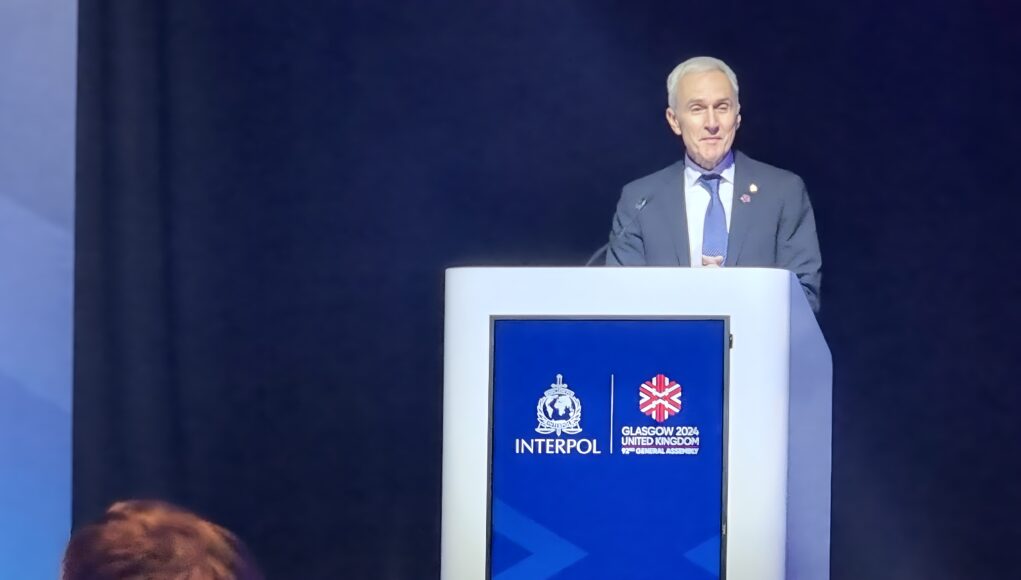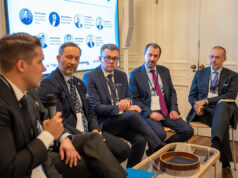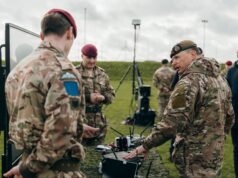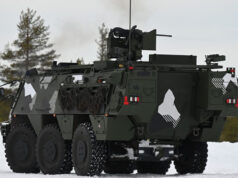At the 92nd INTERPOL General Assembly in Glasgow, Secretary General Jürgen Stock delivered an address marking his final appearance after a decade of leadership.
Reflecting on his tenure, Stock thanked the host city of Glasgiw for its warm welcome, commending the “fantastic venue with enthusiastic and friendly staff.”
He noted that the Assembly is hosting an “almost record number of countries” this year, with 196 nations represented, highlighting INTERPOL as “by far the biggest international organisation in the world.”
Praising the achievements during his time in office, Stock expressed pride in the operational support and governance improvements made across the organisation. “I’m immensely proud of what we have achieved over the last 10 years,” he stated, speaking of INTERPOL’s increased fiscal discipline and enhanced governance. Stock also mentioned the constitutional reforms he introduced in 2014, which include leadership term limits. He explained, “It’s now time for a change in the leadership of INTERPOL.”
Stock highlighted INTERPOL’s role in arresting thousands of serious criminals every year, from cybercriminals to human traffickers. He detailed recent successes in apprehending high-profile fugitives who had been evading capture for up to 25 years, saying, “Every year, thousands of the world’s most serious criminals are arrested thanks to INTERPOL systems.”
He praised INTERPOL’s commitment to neutrality, stating, “A politically neutral INTERPOL is more important than ever in today’s world.”
However, Stock expressed concerns about the ability of global law enforcement to keep up with evolving criminal networks. “I finish my mandate with significant concerns about the ability of global law enforcement to keep the world safe,” he warned. Stock noted the power of organised crime, describing criminal groups as “trillion-dollar organizations that can destabilise even the safest and most prosperous countries.”
He outlined five critical areas for INTERPOL’s future focus: prioritising organised crime, enhancing global cooperation, improving technology for policing, adopting a global policing model, and increasing frontline support.
One of his key points was the growing need for technological advancements in policing, as criminals are using sophisticated tools to exploit vulnerable populations. He called for urgent investment in technology, explaining, “Every day, thousands of people are losing their life savings, being exploited online, or having their businesses disrupted. We need more and urgent investments in technology for law enforcement.”
He also hughlighted the importance of international collaboration to combat cross-border crime, adding, “Criminals can have no safe haven, which is only possible through international cooperation that spans the globe.”
Reflecting on his 45-year career, Stock voiced his commitment to the principles that have guided INTERPOL under his leadership, wishing his successor and INTERPOL’s member countries well in continuing the fight against organised crime.
“This fight is more essential than ever,” he concluded, hoping that INTERPOL’s continued work would build a safer world.














Well, seeing as a convicted criminal might actually be voted as President of the United States, I’d say it’s definitely a losing war on crime.
For a ‘crime’ no one else has ever been convicted of? In a city court, after the federal DOJ says “No case to be made.” Pure political weaponization of the legal system by democrats.
No, it’s really not.
Trump is not some special case, immune to the law, so stop treating him like one.
He’s already been given so much special treatment; delaying court cases, delaying sentencing etc. It’s a joke. Anyone else would have been tried, found guilty and probably already served their sentences.
Trump is a criminal, pure and simple. Hopefully he’ll lose this election, sanity will prevail, and then he can be sentenced for his convicted crimes and then finally go on trial for instigating the 6th January retard rebellion.
I think you will be awaiting an awfully long time for those particular events to unfold…even if he does lose this week!
I do however think it is amusing that the Democrats used the “anyone (Biden excepted) can beat Trump” rationale when choosing their candidate.
It’s not like they thought this once before and it didnt back fire on them is it…
Its like deja vu all over again.
Sadly, he did win. So justice and sanity in the US is now a lost hope.
Dozy Yanks. I reckon if their founding fathers saw the US now they’d have just grumbled and paid the extra tax on the tea.
I agree that not anyone could beat Trump. I had queried before whether Kamala was the right choice. I think if Tim Walz had been the Presidential candidate instead, he might have done better – just through virtue of being a white male.
I think Kamala being black/Asian and a woman lost her some votes.
I hate to say I told ya so but…..
I think she was just a v. poor choice..next to useless both as a deputy to Biden and most importantly as the Democratic candidate.The writing has been in the wall for some time now.. The BBC did have some interesting panelists on their overnight discussions including Trumps ex security advisor (I think) who blasted both of them as next to useless regards international security.
I think im buying shares in a tin hat company this afternoon.